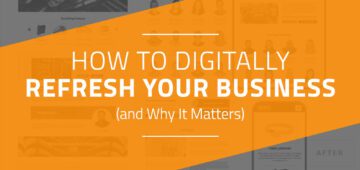In today’s interconnected world, digital marketing is no longer an option – it’s a necessity for businesses of all sizes and across all sectors. But what exactly is digital marketing, and how can it drive tangible benefits for different industries? Let’s explore the dynamic landscape of online promotion.
What Exactly is Digital Marketing?
Digital marketing encompasses all marketing efforts that utilize electronic devices or the internet. It’s about connecting with your target audience where they spend their time online: search engines, social media platforms, email inboxes, websites, and more. Unlike traditional marketing, digital marketing offers a more measurable, targeted, and often cost-effective way to reach potential customers.

Here are some key components of digital marketing:
Search Engine Optimization (SEO): This involves optimizing your website and content to rank higher in search engine results pages (SERPs) like Google. Higher visibility means more organic (non-paid) traffic to your website.
Example: A local bakery optimizing its website with keywords like “best sourdough bread in Iowa” to appear when locals search for bakeries.
Search Engine Marketing (SEM) / Pay-Per-Click (PPC) Advertising: This involves running paid advertisements on search engines. You bid on keywords relevant to your business, and your ads appear when people search for those terms. You only pay when someone clicks on your ad.
Example: An e-commerce store selling hiking boots running Google Ads targeting users searching for “waterproof hiking boots for men.”
Social Media Marketing (SMM): This involves using social media platforms like Facebook, Instagram, X (formerly Twitter), LinkedIn, and TikTok to build brand awareness, engage with your audience, and drive traffic and sales.
Example: A fashion retailer posting visually appealing outfit photos on Instagram and running targeted ad campaigns to reach fashion enthusiasts.
Content Marketing: This focuses on creating and distributing valuable, relevant, and consistent content (e.g., blog posts, articles, videos, infographics, ebooks) to attract and retain a clearly defined audience.
Example: A software company publishing blog posts and whitepapers on industry trends and how their software can solve specific business problems.
Email Marketing: This involves building email lists and sending targeted emails to nurture leads, promote products or services, and build customer loyalty.
Example: An online travel agency sending personalized email offers for vacation packages based on a customer’s past travel history.
Affiliate Marketing: This is a performance-based marketing strategy where you partner with individuals or businesses (affiliates) who promote your products or services and earn a commission for every sale or lead they generate.
Example: A tech blogger includes affiliate links to software they review on their website.
Influencer Marketing: This involves collaborating with individuals who have a significant following and credibility within a specific niche to promote your brand or products to their audience.
Example: A beauty brand partnering with a popular makeup artist on YouTube to review their latest products.
Mobile Marketing: This focuses on reaching audiences on their mobile devices through various channels like SMS marketing, mobile apps, and mobile-optimized websites.
Example: A restaurant sends out promotional text messages with daily specials to nearby customers.
Video Marketing: This involves using video content to engage your audience, educate them about your products or services, and build brand awareness on platforms like YouTube and social media.
Example: A fitness coach creating workout videos and sharing them on their YouTube channel and social media.
Benefits of Digital Marketing Across Various Industries:
Digital marketing offers a plethora of benefits that can be tailored to the specific needs and goals of different industries. Here are some key advantages:
- Wider Reach: Digital platforms allow businesses to reach a global audience, transcending geographical limitations.
- Targeted Marketing: Digital marketing enables precise targeting based on demographics, interests, behaviors, and more, ensuring your message reaches the most relevant audience.
- Measurable Results: Unlike traditional marketing, digital marketing provides robust analytics and tracking, allowing you to measure the effectiveness of your campaigns and make data-driven decisions.
- Cost-Effectiveness: Often, digital marketing strategies can be more cost-effective than traditional methods, especially for small and medium-sized businesses.
- Personalization: Digital channels allow for personalized communication and offers, leading to stronger customer relationships and increased loyalty.
- Real-time Engagement: Social media and other digital platforms facilitate direct interaction with customers, allowing for immediate feedback and relationship building.
- Increased Brand Awareness: Consistent and strategic digital marketing efforts can significantly enhance brand visibility and recognition.
- Improved Customer Loyalty: By providing valuable content and engaging with customers online, businesses can foster stronger relationships and build loyalty.
- Higher Conversion Rates: Targeted digital marketing campaigns can lead to higher conversion rates by reaching the right people with the right message at the right time.
- Competitive Advantage: A strong digital presence can help businesses stand out from competitors and attract new customers.
How Gradient9 Can Jumpstart Your Digital Marketing
So, if all that digital marketing stuff sounds like a lot, don’t sweat it – that’s where we come in! At Gradient9, we’re all about getting you results with the key digital tools. Think of us as your go-to crew for the first five: getting you found on Google with SEO, running smart PPC ads that bring in clicks, making your brand known on social media, creating content that folks want to read, and email marketing that keeps people engaged.
Now, we’re not gonna lie – things like affiliate and influencer marketing, mobile apps, or becoming video production whizzes aren’t exactly our main jam. But we know some people who are experts in those areas. So, if you need a hand with those later down the road, we’re happy to play matchmaker and connect you with folks we trust to get the job done right!
Digital Marketing in Action: Industry-Specific Examples
E-commerce:
Benefits: Drive online sales through targeted advertising, SEO for product pages, email marketing for abandoned carts and promotions, and social media marketing to showcase products and engage with customers.
Example: An online clothing retailer using Instagram to showcase new arrivals and running Facebook Ads targeting users interested in specific fashion styles. They also use email marketing to remind customers about items left in their shopping carts.
Healthcare:
Benefits: Increase patient acquisition through local SEO, build trust through informative content marketing (blog posts, articles on health topics), improve patient communication through email and secure messaging, and enhance brand reputation through positive online reviews.
Example: A dental clinic optimizing its website for local searches like “dentist near me” and publishing blog posts on oral hygiene tips. They also use email to send appointment reminders to patients.
Hospitality (Hotels, Restaurants, Tourism):
Benefits: Drive bookings through targeted online advertising, showcase offerings through visually appealing social media content, manage online reputation through review monitoring and response, engage with potential guests through social media contests and promotions, and utilize email marketing for special offers and loyalty programs.
Example: A hotel using Instagram to showcase its beautiful rooms and amenities and running targeted ads to users searching for hotels in their area. They also use email to offer discounts to repeat guests.
Real Estate:
Benefits: Generate leads through online advertising and landing pages, showcase properties through virtual tours and high-quality photos/videos on websites and social media, build relationships with potential buyers and sellers through content marketing (blog posts on home buying/selling tips), leverage social media for local market updates and open house announcements.
Example: A real estate agent using Facebook Ads to target potential homebuyers in a specific neighborhood and creating virtual tours of properties to showcase online.
Education:
Benefits: Increase student enrollment through targeted online advertising and social media campaigns, build brand awareness through informative content marketing (blog posts, webinars), engage with prospective students through social media and email marketing, and improve communication with current students and alumni through email newsletters and online communities.
Example: A university running Google Ads targeting students searching for specific degree programs and using LinkedIn to connect with prospective students and alumni.
Manufacturing
Benefits: Generate B2B leads through targeted LinkedIn advertising and content marketing (whitepapers, case studies), improve brand visibility within the industry through online publications and social media, nurture leads through email marketing, provide customer support through online portals and resources.
Example: A manufacturing company publishing whitepapers on industry best practices and using LinkedIn to connect with potential business clients.
Conclusion:
Digital marketing is a powerful and versatile tool that offers significant benefits for businesses across all industries. By understanding its various components and tailoring strategies to specific industry needs and target audiences, businesses can unlock growth, build stronger customer relationships, and achieve their marketing goals in today’s digital-first world. Embracing the dynamic nature of digital marketing and continuously adapting to new trends and technologies is crucial for staying competitive and thriving in the long run.





